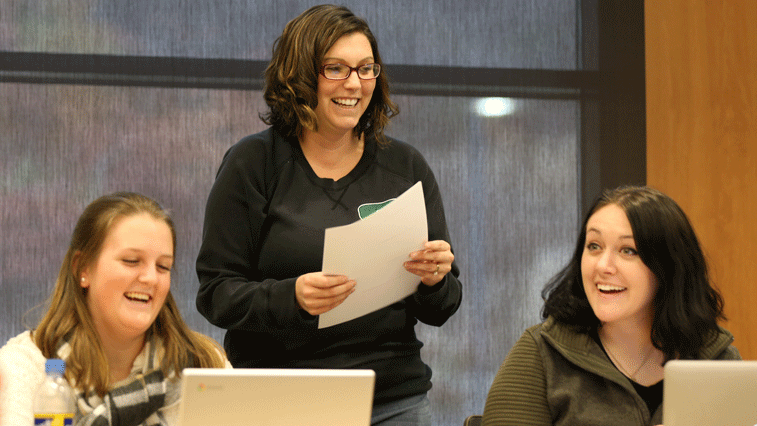SRU training 10 peer coaches for emotional wellness program

Renee Bateman (center), Slippery Rock University’s health promotion coordinator, is leading 10 peer coaches through training so they will be prepared to help their fellow students in the spring semester as part of the University’s recently launched emotional wellness program
Nov. 27, 2017
SLIPPERY ROCK, Pa. - Ten Slippery Rock University students are learning how to become peer coaches as part of the University's recently launched emotional wellness program.
A component of this mental health initiative, approved by SRU's council of trustees in March and implemented by the University's Student Health Center fall 2017, is the hiring of student workers who will coach other SRU students who need help reaching their goals.
The SRU peer coaches are receiving 20 hours of training so that they can serve as many as 10 hours per week beginning in the spring 2018 semester. Selected from a pool of 50 applicants, the peer coaches will work one-on-one with as many as four students who opt into emotional wellness services offered by the SHC.
"The peer coaches will help students with whatever goals they have and help empower them to reach those goals," said Renee Bateman, health promotion coordinator, who is leading the peer coach training. "We have a lot of great resources already on campus but we are seeing more of a demand from students who want services for their mental health. We want to take a public health approach to the problem."
The SHC saw a 32-percent increase in visits from students for "psychological issues" from the 2014-15 to 2015-16 academic years, and while the demand stabilized last year, students are still eager to get help for themselves and others. According to a survey administered in 2016, 60 percent of SRU students said they wanted to receive information about depression, anxiety and stress, while 62 percent wanted to receive information about how to help a friend in distress.
Bateman said the peer coaches are not providing clinical counseling services but rather offering life skills, stress management advice and social support, such as prioritizing a daily schedule of a student who is feeling overwhelmed or connecting a student who is feeling homesick with opportunities to become more engaged. This type of support will help students become more resilient and lead to better retention rates and student success, she said.
"A peer coach is not someone who is going to tell you what to do, but ask the right questions to steer you in the right direction," said Patrick Spaulding, a sophomore psychology major from Las Vegas, Nevada, who will be one of the 10 peer coaches. "We're not going to catch all the fish for you, but teach you how to fish so you can do it for yourself."
Like all of the peer coaches, Spaulding can relate to students better than a faculty or staff member. Spaulding, who grew up in Maine before his family moved to Las Vegas, said he did not have good grades in high school and after he graduated, took two years off from school to play hockey in Massachusetts before enrolling in college.
"Everyone has different circumstances," Spaulding said. "As I got older, I learned proper ways to study and manage my time and how to set proper goals. We genuinely care about the students. A lot of us experienced hard times and helped friends get through it."
The peer coaches come from a variety of backgrounds and majors. They have experience such as serving as summer camp counselors or they are pursuing a career in fields related to health services, counseling or leadership development.
"The common theme is they are a group of people who really want to help others and be there for others," said Bateman, who was pleasantly surprised by the interest in the program. "A lot of them are going to have that positive, optimistic point of view. They see it as a program that could be helpful to them so they wanted to be involved."
According to Bateman, there are already nine SRU students who are interested in having a peer coach when the program starts and more will be identified as the program develops. Students seeking help for themselves or others can complete a Care Report by clicking here.
In addition to peer coaches, the new emotional wellness program consists of:
-A campaign to promote mental health.
-The addition of one full-time professional.
-Emotional wellbeing workshops.
-Expanding the development of the "Just in Case" mobile app that was implemented in 2016 to provide students with potentially lifesaving information.
For more information about the peer coaching program and mental health services at SRU, contact Bateman at: 724.738.4206 or renee.bateman@sru.edu.
MEDIA CONTACT: Justin Zackal | 724.738.4854 | justin.zackal@sru.edu

